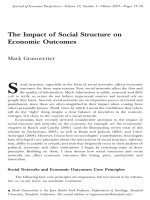Impact of economic crises on mental health potx
Bạn đang xem bản rút gọn của tài liệu. Xem và tải ngay bản đầy đủ của tài liệu tại đây (2.19 MB, 34 trang )
World Health Organization
Regional Oce for Europe
Schergsvej 8
DK-2100 Copenhagen Ø
Denmark
Tel.: +45 39 17 17 17
Fax: +45 39 17 18 18
E-mail:
Web site: www.euro.who.int
Member States
The WHO Regional Oce for Europe Abstract
The World Health Organization (WHO) is a
specialized agency of the United Nations
created in 1948 with the primary responsibility
for international health matters and public
health. The WHO Regional Oce for Europe
is one of six regional oces throughout the
world, each with its own programme geared
to the particular health conditions of the
countries it serves.
Albania
Andorra
Armenia
Austria
Azerbaijan
Belarus
Belgium
Bosnia and
Herzegovina
Bulgaria
Croatia
Cyprus
Czech Republic
Denmark
Estonia
Finland
France
Georgia
Germany
Greece
Hungary
Iceland
Ireland
Israel
Italy
Kazakhstan
Kyrgyzstan
Latvia
Lithuania
Luxembourg
Malta
Monaco
Montenegro
Netherlands
Norway
Poland
Portugal
Republic of Moldova
Romania
Russian Federation
San Marino
Serbia
Slovakia
Slovenia
Spain
Sweden
Switzerland
Tajikistan
The former Yugoslav
Republic of
Macedonia
Turkey
Turkmenistan
Ukraine
United Kingdom
Uzbekistan
The economic crisis is expected
to produce secondary mental
health eects that may increase
suicide and alcohol death rates.
However, the mental health
eects of the economic crisis
can be oset by social welfare
and other policy measures. For
example, active labour market
programmes aimed at helping
people retain or regain jobs
counteract the mental health
eects of the economic crisis.
Family support programmes
contribute to counteracting
the mental health eects of
the crisis. Increasing alcohol
prices and restricting alcohol
availability reduce the harmful
eects on mental health
and save lives. Debt relief
programmes will help to reduce
the mental health eects of the
economic crisis and accessible
and responsive primary care
services support people at risk
and prevent mental health
eects.
Impact of economic
crises on mental health
mnh&eco__COVER 08.indd 1 2/24/2011 10:56:25 AM
Impact of economic
crises on mental health
ABSTRACT
The economic crisis is expected to produce secondary mental health
effects that may increase suicide and alcohol death rates. However, the
mental health effects of the economic crisis can be offset by social
welfare and other policy measures. For example, active labour market
programmes aimed at helping people retain or regain jobs counteract
the mental health effects of the economic crisis. Family support
programmes contribute to counteracting the mental health effects of the
crisis. Increasing alcohol prices and restricting alcohol availability reduce
the harmful effects on mental health and save lives. Debt relief
programmes will help to reduce the mental health effects of the
economic crisis and accessible and responsive primary care services
support people at risk and prevent mental health effects.
Keywords
MENTAL HEALTH
ECONOMIC RECESSION
ALCOHOLISM – prevention and control
SUICIDE – prevention and control
HEALTH POLICY
PRIMARY HEALTH CARE
EUROPE
Cover
p
hoto: © Zoltán Balo
g
h/VIPC 2007
Address requests about publications of the WHO Regional Office for Europe to:
Publications
WHO Regional Office for Europe
Scherfigsvej 8
DK-2100 Copenhagen Ø, Denmark
Alternatively, complete an online request form for documentation, health information, or for permission to
quote or translate, on the Regional Office web site (
© World Health Organization 2011
All rights reserved. The Regional Office for Europe of the World Health Organization welcomes
requests for permission to reproduce or translate its publications, in part or in full.
The designations employed and the presentation of the material in this publication do not imply the
expression of any opinion whatsoever on the part of the World Health Organization concerning the
legal status of any country, territory, city or area or of its authorities, or concerning the
delimitation of its frontiers or boundaries. Dotted lines on maps represent approximate border lines
for which there may not yet be full agreement.
The mention of specific companies or of certain manufacturers’ products does not imply that they
are endorsed or recommended by the World Health Organization in preference to others of a
similar nature that are not mentioned. Errors and omissions excepted, the names of proprietary
products are distinguished by initial capital letters.
All reasonable precautions have been taken by the World Health Organization to verify the
information contained in this publication. However, the published material is being distributed
without warranty of any kind, either express or implied. The responsibility for the interpretation
and use of the material lies with the reader. In no event shall the World Health Organization be
liable for damages arising from its use. The views expressed by authors, editors, or expert groups
do not necessarily represent the decisions or the stated policy of the World Health Organization.
CONTENTS
Page
Foreword 1
Acknowledgements 2
Supplementary material 2
1. Mental health creates mental capital 1
2. How can we contribute to mental health? 3
3. Who will the crisis hit? 6
4. How to mitigate the effects of the crisis 8
4.1 Active labour market programmes 11
4.2 Family support programmes 11
4.3 Control of alcohol prices and availability 12
4.4 Primary care for the people at high risk of mental
health problems 12
4.5. Debt relief programmes 12
5. How to maintain mental health systems in the economic
crisis 13
Tackle the stigma of mental illness 13
Build the case for investing in mental health 14
Continue mental health reforms 14
Ensure universalism in mental health services 14
6. Conclusions 15
References 16
Impact of economic crises on mental health
page 1
Foreword
It is well known that mental health problems are related to
deprivation, poverty, inequality and other social and economic
determinants of health. Economic crises are therefore times of high
risk to the mental well-being of the population and of the people
affected and their families.
The economic crisis that started in 2007 has continued to pose major
challenges in the WHO European Region. It has led to significant
declines in economic activity, a rise in unemployment, depressed
housing markets and an increasing number of people living in poverty.
The rise in national debt is forcing governments to implement severe
cuts in public spending. Significant risks remain in the world
economy, and many countries are facing an era of austerity in health
and welfare services.
The focus on social and economic determinants of the forthcoming
new European health policy, Health 2020, will acknowledge these
new life circumstances. It will stress that health objectives are
influenced by a range of social objectives that require action across
many sectors. This notion is especially important in times of economic
crisis, because policy actions in sectors other than health can amend
some of the health effects of the crisis. Targeted investment in public
services that are crucial for many people’s well-being can ameliorate
the social and economic determinants of health and the associated
health disparities. The integrated response across policies must
include accessible health services, with a focus on primary care
response.
This booklet aims to present current knowledge on how economic
downturns affect population mental health and outlines some of the
benefits of action that could be implemented to reduce the harmful
effects on mental health of the current economic crisis. Of particular
value is addressing both the benefits of welfare policies and the value
of health action. Neither should be considered in isolation, since a
lesson from this crisis is the interconnectedness of economic activity
and mental health.
Zsuzsanna Jakab
WHO Regional Director for Europe
Impact of economic crises on mental health
page 2
Acknowledgements
The following people contributed to this publication:
• Kristian Wahlbeck, WHO Regional Office for Europe;
• Peter Anderson, Faculty of Health, Medicine and Life Sciences,
Maastricht University, Netherlands;
• Sanjay Basu, Department of Medicine, University of California
at San Francisco, USA;
• David McDaid, WHO European Observatory on Health
Systems and Policies, Brussels, Belgium and LSE Health and
Social Care, London School of Economics and Political
Science, United Kingdom; and
• David Stuckler, Department of Global Health and Population,
Harvard University, USA.
The following people served as external advisers for this publication:
• Pol Gerits, Federal Public Service Health, Food Chain Safety
and Environment, Brussels, Belgium;
• Hristo Hinkov, National Centre for Public Health Protection,
Sofia, Bulgaria; and
• Regula Ricka-Heidelberger, Federal Department of Home
Affairs, Berne, Switzerland.
Supplementary material
This guide is accompanied by two reviews of evidence, available on
• Stuckler D, Basu S, McDaid D. Depression amidst depression.
Mental health effects of the ongoing recession. A background
paper prepared for the WHO Regional Office for Europe
• Anderson P. Economic crisis and mental health and well-being.
A background paper prepared for the WHO Regional Office for
Europe.
Impact of economic crises on mental health
page 1
1. Mental health creates mental capital
There is no health without mental health (1)
Mental health is an indivisible part of public health and significantly
affects countries and their human, social and economic capital. Mental
health is not merely the absence of mental disorders or symptoms but
also a resource supporting overall well-being and productivity.
Positive mental health is a state of well-being in which the individual
realizes his or her own abilities, can cope with the normal stresses of
life, can work productively and fruitfully and can contribute to his or
her community (2).
Good mental health allows for cognitive and emotional flexibility,
which are the basis for social skills and resilience in the face of stress.
This mental capital is vitally important for the healthy functioning of
families, communities and society.
As with individuals, societies can be more or less resistant to such
stressors as economic crises. Economic shocks can destabilize public
service budgets and affect education and health care systems.
However, available data show that legislation for protecting social
welfare can increase the resilience of communities to economic shocks
and mitigate the mental health effects of unemployment and the stress-
related consequences of economic downturns (3).
Conversely, while economic crises may have mental health effects,
mental health problems have increasingly significant economic
effects. The economic consequences of mental health problems –
mainly in the form of lost productivity – are estimated to average 3–
4% of gross national product in European Union (EU) countries (4).
Because severe mental disorders often start in adolescence or young
adulthood, the loss of productivity can be long-lasting. Mental
disorders account for more than one third of the years lived with
disability in the WHO European Region (Fig. 1).
Work changes increase the cognitive and emotional demands of
work (5). Absenteeism and withdrawal from the labour market have
Impact of economic crises on mental health
page 2
increased because of stress, anxiety and depression-related
disorders (6). In many European countries, about one third of new
disability benefits are attributable to mental health conditions, and this
share is increasing (7).
Thus, mental health is an important economic factor. The shift from a
manufacturing to a knowledge society emphasizes even more the
importance of mental health for sustaining productivity. Good
population mental health contributes to economic productivity and
prosperity, making it crucial for economic growth (5).
The successful recovery of European economies appears to crucially
depend on the mental health of the population. The following sections
outline how countries can safeguard and support mental health in
times of economic downturn.
Fig. 1. Percentage contribution of underlying health conditions to the
number of years lived with disability in the European Region in 2004
33%
52%
8%
7%
Mental disorders
Other noncommunicable
diseases
Communicable
diseases
Injuries
Source: The global burden of disease: 2004 update (8).
Impact of economic crises on mental health
page 3
2. How can we contribute to mental health?
Mental health is determined by socioeconomic and
environmental factors (2).
An economic crisis affects the factors determining mental health.
Protective factors are weakened and risk factors strengthened.
(Table 1)
Employment benefits mental health (9). Job security, sense of control
of work and social support at work are factors promoting the mental
health of employees (10). Stable employment, secure incomes and
social capital predict good mental health. Social capital is the quality
of social relationships within societies or communities, including
community networks, civic engagement, sense of belonging and
norms of cooperation and trust (11).
Conversely, poverty, financial problems and social deprivation are
major socioeconomic risk factors for mental health problems and
disorders (12,13). In most parts of the European Region, alcohol
consumption is negatively associated with population mental health.
Alcohol consumption plays a considerable role in increasing suicide,
especially among men (14,15).
Mental health problems contribute significantly to inequality in health
in the European Region. Relatively high frequencies of common
mental disorders are associated with poor education, material
disadvantage and unemployment (12). Suicide is more common in
areas of high socioeconomic deprivation, social fragmentation and
unemployment (16–19). Increasing income inequality has been linked
to increasing suicide rates (Fig. 2) (20). The greater vulnerability of
the disadvantaged people in each community to mental health
problems may be explained by such factors as the experience of
insecurity and hopelessness, poor education, unemployment,
indebtedness, social isolation and poor housing.
The foundations of good mental health are laid during pregnancy,
infancy and childhood. Abstaining from alcohol, substance use and
smoking during pregnancy promotes a healthy start in life. Protection
from childhood neglect and negative life events promotes mental
Impact of economic crises on mental health
page 4
health. Feeling respected, valued and supported, high-quality
parenting and a positive relationship with an adult (21) promote
positive mental health and resilience. Mental health is promoted by
holistic preparation for life in preschools and schools by providing
social and emotional learning opportunities (22).
The health sector cannot achieve good mental health alone. The
determinants of mental health are often outside the remit of the health
system, and all government sectors have to be involved in promoting
mental health.
Table 1. Determinants of population mental health
Protective factors Risk factors
Social capital and welfare protection Poverty, poor education, deprivation,
high debt
Healthy prenatal and childhood
environment
Poor prenatal nutrition, abuse, harsh
upbringing, poor relationship to
parents, intergenerational
transmission of mental health
problems
Healthy workplace and living Unemployment, job insecurity, job
stress
Healthy lifestyles Alcohol and/or drug use
Impact of economic crises on mental health
page 5
Fig. 2. Association between change in suicide rates and income
inequality (Gini coefficient) in selected countries in the WHO European
Region
The data on standardized death rates from suicide and self-inflicted injuries
per 100 000 population are from the WHO European Health for All database.
The data on Gini coefficients are from the World Income Inequality
Database. The data on Gini coefficients are from 1989 to 1996 for Bulgaria,
from 1989 to 1998 for Croatia and from 1988 to 1994 for the Republic of
Moldova. The correlation presented in the figure is weighted by population
size and adjusted for changes in gross domestic product per capita
(purchasing power parity in US dollars).
Source: De Vogli & Gimeno (20). Licence for reproduction kindly granted by
BMJ Publishing Group Ltd, licence number 2560800958862.
Impact of economic crises on mental health
page 6
3. Who will the crisis hit?
It is the poor that will be hardest hit by the
current economic crisis. (23).
The current economic crisis is increasing poverty in the European
Region. The economic crisis will hit people with low income – and
those made poor through loss of income or housing – the hardest (24).
The economic crisis has increased the number of households in high
debt, repossession of houses and evictions.
The current economic crisis is probably increasing the social
exclusion of vulnerable groups, low-income people and people living
near the poverty line in the European Region (23). Such vulnerable
groups include children, young people, single-parent families,
unemployed people, ethnic minorities, migrants and older people.
Economic pressure, through its influence on parental mental health,
marital interaction and parenting, affects the mental health of children
and adolescents (25–27). The effects of extreme poverty on children
include deficits in cognitive, emotional and physical development, and
the consequences on health and well-being are lifelong (28).
Social gradients of health exist in Europe, and moving down the
socioeconomic ladder due to loss of jobs and income affects people’s
health (29). During recessions, social inequality in health can widen
(30,31). The least well-educated people are at greatest risk of ill health
after job loss (24).
Unsurprisingly, substantial research has revealed that people who
experience unemployment, impoverishment and family disruptions
have a significantly greater risk of mental health problems, such as
depression, alcohol use disorders and suicide, than their unaffected
counterparts (32–41). Especially men are at increased risk of mental
health problems (42) and death due to suicide (17) or alcohol use (43)
during times of economic adversity. Unemployment contributes to
depression (32) and suicide (44–46), and young unemployed people
have a higher risk of getting mental health problems than young
people who remain employed. Evidence indicates that debt, financial
difficulties and housing payment problems lead to mental health
Impact of economic crises on mental health
page 7
problems (47–50). The more debt people have, the more likely they
are to have mental disorders overall (Fig. 3) (51).
The crisis will increase mortality linked to mental health problems. In
the EU, increases in national unemployment rates are associated with
increases in suicide rates (3,52). In the Russian Federation, the
societal change after the dissolution of USSR in 1991 and the collapse
of the rouble in 1998 have been followed by increases in alcohol-
related deaths (53). Likewise, great increases in unemployment have
been linked to a 28% rise in deaths from alcohol use in the EU (3).
It can be concluded that the economic crisis is likely to negatively
affect health, especially mental health. The next sections outline
possible measures to mitigate the mental health effects of the current
crisis.
Fig. 3. The more debt people have, the worse their mental health
Odds ratios (OR) for risk of mental illness in people with increasing
number of debts
0
1
2
3
4
5
6
7
123≥4
No. of debts
OR risk of mental illness
Unadjusted
Adjusted f or income
Adjusted f or income and
key sociodemographic
variables
The data were derived from a nationally representative sample of 8600
people living in the United Kingdom. Key sociodemographic variables used
for adjustment were age, ethnicity, marital status, household size, household
tenure, education, social class, employment status, urban or rural, and region.
Source: Jenkins et al. (51).
Impact of economic crises on mental health
page 8
4. How to mitigate the effects of the crisis
Policy choices determine whether the economic recession will
significantly affect mental health outcomes. Recent data suggest that
active labour market programmes, aimed at helping people retain jobs
and quickly regain employment, along with family support measures,
restrictions in alcohol availability, debt relief programmes and access
to mental health-related services can be effective in preventing or
mitigating adverse effects of recession on mental health.
Fig 4. Framework linking economic crisis and mental health outcomes
Economiccrisis
Changesinmacro‐economicenvironment
•Jobshortage
•Increasinghouseholddebts
•Incomeinequality
Policyresponses
Mentalhealthriskfactors
•Unemploy ment
•Poverty,housingproblemsandfamilystrain
•Impairedaccesstopublicservices
Mentalhealth
Economic downturns result in smaller changes in the mental health of
the population in countries with strong social safety nets (Fig. 4) (54).
European data indicate that inequality in health does not necessarily
widen during a recession in countries with good formal social
protection. In Finland and Sweden, during a period of deep economic
recession and a large increase in unemployment, inequality in health
remained broadly unchanged and suicide rates diminished, possibly
because social benefits and services broadly remained and buffered
against the structural pressures towards widening inequality in health
(55–57). The European findings are echoed by findings in the United
Impact of economic crises on mental health
page 9
States of America linking increased suicide rates with reductions in
state welfare spending (58). Data from EU countries indicate that
unemployment does not increase suicide if spending on welfare
programmes is above US$ 190 per person per year (3). Welfare
spending is well below this threshold in many countries in the eastern
part of the European Region (Fig. 5), indicating that the mental health
gap between the eastern and western parts of the European Region
will rise as a result of the economic downturn.
Fig. 5. Quantity and distribution of social welfare spending (purchasing
power parity per person in US dollars) in OECD countries in eastern
and western Europe, 2003
Eastern Europe: Czech Republic, Hungary, Poland and Slovakia. Western
Europe: OECD countries in the EU except Czech Republic, Estonia,
Hungary, Poland, Slovakia and Slovenia.
Source: Stuckler et al. (3). Licence for reproduction kindly granted by
Elsevier Limited, licence number 2563630419149.
Impact of economic crises on mental health
page 10
The collated data indicate that social protection responses are crucial
in mitigating mental health in the economic crisis. Governments need
to target social protection interventions to address priority needs
among the most vulnerable people, providing high coverage among
the people with the lowest income and providing support for families
at risk.
An example is the suicide rates in Sweden and Spain from 1980 to
2005. In the early 1990s, Sweden underwent a severe bank crisis,
resulting in a very rapid rise in unemployment, but suicide rates were
unaffected, falling steadily over this period. This contrasts with the
situation in Spain, with multiple banking crises in the 1970s and
1980s. As unemployment rates rose, suicide rates increased; when
unemployment fell, suicide rates fell too (Fig. 6). Although there are
many differences between Sweden and Spain, one argument is that a
major differentiating factor was the extent to which resources were
budgeted for social protection, such as family support,
unemployment benefits and health care services.
Fig. 6. Unemployment rate and suicide rates per 100 000 males in
Sweden and Spain, 1980–2005
Source: Stuckler et al. (3).
Current research suggests that the mental health effects of economic
crises depend on action in five key areas:
1. active labour market programmes
2. family support programmes
3. control of alcohol prices and availability
Impact of economic crises on mental health
page 11
4. primary care for the people at high risk of mental health
problems
5. debt relief programmes.
4.1 Active labour market programmes
Active labour market programmes that keep and reintegrate workers
in jobs reduce the mental health effects of recessions. The average
association observed in EU countries for a 1% rise in the
unemployment rate is a 0.8% rise in the suicide rate. In EU countries,
each additional US$ 100 per person spent on active labour market
programmes per year reduced the effect of a 1% rise in unemployment
rate on the suicide rate by 0.4 percentage points (3). Active labour
market programmes aim at improving the prospects of finding gainful
employment and include public employment services, labour market
training, special programmes for youth in transition from school to
work and labour market programmes to provide or promote
employment for unemployed people and people with disabilities.
Active labour market programmes include resilience-building mental
health promotion programmes for unemployed people. European
studies indicate that such programmes, which provide group
psychological support for unemployed people, promote mental health
and increase re-employment rates (59–61). Cost–effectiveness
evaluations of such interventions have reported savings for public-
sector providers of social welfare benefits and employers alike
through increased rates of employment, higher earnings and fewer job
changes (60,62,63).
4.2 Family support programmes
Women and children feel the effects of an economic crisis. Families
with low income are especially hurt by cuts in health and education
budgets. Family strain may lead to increases in family violence and
child neglect.
In EU countries, each US$ 100 per person spent on family support
programmes reduced the effect of unemployment on the suicide rate
by 0.2 percentage points (3). Family support includes support for the
costs of children and other dependants as well as support for maternity
and parental leave.
Impact of economic crises on mental health
page 12
4.3 Control of alcohol prices and availability
The most effective and cost-effective policies include controls on the
price and availability of alcohol (64). Policy action to increase the
price of alcohol reduces consumption and the associated harm across
the whole population (65,66). Alcohol policy, and especially policy
that increases the price of alcohol, reduces deaths from alcohol use
disorders.
4.4 Primary care for the people at high risk of
mental health problems
Improved responsiveness of health services to changes in people’s
social, employment and income status and early recognition of mental
health problems, suicidal ideas and heavy drinking will reduce the
human toll of the recession. Meeting the mental health challenges of
the economic crisis requires not only protecting spending on mental
health services but also restructuring services to meet the needs of the
population. Well-developed community-based mental health services
are linked to reductions in suicide (67). The primary care approach
increases access to mental health care and shifts the focus to
preventing mental health problems and detecting them early. The
current economic crisis may create urgency and strengthen the
courage to eliminate the fundamental problems in hospital-dominated
health care delivery and reduce inequality in health.
Responsive health services modify their services to accommodate the
population needs originating from the economic crisis. Providing
psychological support in health services can modify the effects of
unemployment and indebtedness. Good mental coping skills are
beneficial in times of hardship. Promoting problem-solving skills may
protect against depression and suicidal behaviour. Heavy drinkers will
benefit from the delivery of brief interventions in primary care.
4.5. Debt relief programmes
National debt relief legislation and debt relief programmes will help to
reduce the mental health effects of the economic crisis. Debt relief
programmes help people who are suffering from the stress of
excessive debt (68). Debt advice helps individuals to improve their
financial situation and may also improve their mental health (69).
Impact of economic crises on mental health
page 13
5. How to maintain mental health systems
in the economic crisis
Mental health problems, binge drinking (35,70), suicide and (in many
countries) alcohol-related deaths tend to increase during economic
downturns, creating a need for governments to upgrade mental health
action.
Many countries in the European Region are facing pressure from the
international financial community to reduce health and welfare
budgets. Despite increased need, mental health is a vulnerable target
of these cuts, as it usually lacks a strong advocacy base to oppose
them, unlike physical illnesses.
Evidence from past economic crises predicts what is likely to happen
in the current economic downturn. Despite increased pressure on
mental health services (71), government expenditure on health will be
squeezed and will probably fall in real terms, contributing to worse
health outcomes. Household income to pay for health services will
drop. Insurance protection will decline. People will switch from the
services that require out-of-pocket spending to less costly services: in
some countries this means switching from the private to the public
health care sector. In countries without comprehensive services
funded by taxes or health insurance, the people who need mental
health services the most may have less access to them because of the
costs involved. Overall, the health effects of the economic downturn
will be less pronounced in countries with better social safety nets (72).
Tackle the stigma of mental illness
One reason for the apparent low funding priority given to and neglect
of mental illness is the high level of stigma associated with mental
health problems (73). Countering this stigma and discrimination
remains one of the most critical challenges for improving mental
health in Europe because this stigma may influence the willingness of
public policy-makers to invest in mental health. Past public surveys in
some countries have indicated that mental health can be given low
priority in terms of safeguarding services in the face of budget cuts
(74,75). Although general population anti-stigma campaigns have
shown only modest effects, targeted approaches seem more
effective (76).
Impact of economic crises on mental health
page 14
Build the case for investing in mental health
Demonstrating that investing in mental health has economic benefits
may help in persuading governments to invest in mental health.
Investing in mental health action, both inside and outside the health
care sector, provides resources and opportunities to reduce the risk of
social exclusion and promote social integration. It is crucial to take a
broader economic perspective than that of the health system alone and
to communicate that investment in mental health generates savings in
other sectors (77). Despite the availability of cost-effective
interventions that can mitigate or prevent much of the effects of poor
mental health, the priority it receives in most health care systems has
been remarkably low so far (78–80).
Continue mental health reforms
Due to financial constraints, governments will inevitably have to
review their welfare services. It is important that any changes imposed
support the mental health agenda for the European Region of
deinstitutionalization and strengthening primary health care.
Increasing the efficiency of services can go hand in hand with
developing modern mental health services. Sound financial incentives
are needed to support the provision of high-quality community care
and to use existing resources optimally. Linking funding to
accreditation systems and assessment of provider performance will
support the development of services.
Ensure universalism in mental health services
In times of economic hardship, access to basic social safety networks
is increasingly important. Universal coverage of mental health
services is a cornerstone in reducing the effects of the crisis and is
likely to restrain social inequality in health (81).
Impact of economic crises on mental health
page 15
6. Conclusions
The effects of the present economic crisis on mental health present an
opportunity to strengthen policies that would not only mitigate the
impact of the recession on deaths and injuries arising from suicidal
acts and alcohol use disorders but also reduce the health and economic
burden presented by impaired mental health and alcohol use disorders
in any economic cycle. There are powerful public health arguments
for social protection, active labour market programmes, family
support, debt relief and effective alcohol policy, and the present
economic downturn strengthens these arguments.
Governments could consider reorienting budgets to protect
populations now and in the future by budgeting for measures that keep
people employed, helping those who lose their jobs and their families
to overcome the negative effects of unemployment and enabling
unemployed people to regain work quickly.
Governments could consider strengthening their alcohol policies, in
particular by raising the price of alcohol or introducing a minimum
price. Such a policy would have a particular effect on reducing the
harm of risky and heavy episodic patterns of drinking.
Mental health service provision needs to be strengthened by continued
efforts to develop universal mental health care, supported by sound
financial incentives for good quality community care.
Impact of economic crises on mental health
page 16
References
1. Prince M et al. No health without mental health. Lancet, 2007,
370:859–877.
2. Herrman H, Saxena S, Moodie R. Promoting mental health:
concepts, emerging evidence, practice. Geneva, World Health
Organization, 2005
( accessed 10
December 2010).
3. Stuckler D et al. The public health effect of economic crises and
alternative policy responses in Europe: an empirical analysis.
Lancet, 2009, 374:315–323.
4. Gabriel P, Liimatainen M-R. Mental health in the workplace.
Geneva, International Labour Office, 2000.
5. Weehuizen R. Mental capital. The economic significance of
mental health. Maastricht, Universitaire Pers Maastricht, 2008.
6. Järvisalo J et al., eds. Mental disorder as a major challenge in
prevention of work disability. Helsinki, Social Security
Institution, 2005.
7. Mental health, disability and work. Issues for discussion.
OECD Expert Meeting 26–28 April 2010. Paris, Organisation
for Economic Co-operation and Development, 2010.
8. The global burden of disease: 2004 update. Geneva, World
Health Organization, 2008
( />BD_report_2004update_full.pdf, accessed 10 December 2010).
9. Waddell G, Burton AK. Is work good for your health and
wellbeing? Norwich, The Stationery Office, 2006.
10. Sanderson K, Andrews G. Common mental disorders in the
workforce: recent findings from descriptive and social
epidemiology. Canadian Journal of Psychiatry, 2006, 51:63–
75.
11. Almedom AM. Social capital and mental health: an
interdisciplinary review of primary evidence. Social Science
and Medicine, 2005, 61:943–964.
Impact of economic crises on mental health
page 17
12. Fryers T et al. The distribution of the common mental disorders:
social inequalities in Europe. Clinical Practice in Epidemiology
and Mental Health, 2005, 1:14.
13. Laaksonen E et al. Socioeconomic circumstances and common
mental disorders among Finnish and British public sector
employees: evidence from the Helsinki Health Study and the
Whitehall II Study. International Journal of Epidemiology,
2007, 36:776–786.
14. Nemtsov A. Suicides and alcohol consumption in Russia, 1965–
1999. Drug and Alcohol Dependence, 2003, 71:161–168.
15. Norström T, Ramstedt M. Mortality and population drinking: a
review of the literature. Drug and Alcohol Review, 2005,
24:537–547.
16. Rehkopf DH, Buka SL. The association between suicide and the
socio-economic characteristics of geographical areas: a
systematic review. Psychological Medicine, 2006, 36:145–157.
17. Berk M, Dodd S, Henry M. The effect of macroeconomic
variables on suicide. Psychological Medicine, 2006, 36:181–
189.
18. Middleton N et al. Suicide risk in small areas in England and
Wales, 1991–1993. Social Psychiatry and Psychiatric
Epidemiology, 2004, 39:45–52.
19. Middleton N, Sterne JA, Gunnell D. The geography of despair
among 15–44-year-old men in England and Wales: putting
suicide on the map. Journal of Epidemiology and Community
Health, 2006, 60:1040–1047.
20. De Vogli R, Gimeno D. Changes in income inequality and
suicide rates after “shock therapy”: evidence from Eastern
Europe. Journal of Epidemiology and Community Health, 2009,
63:956.
21. Werner EE. Journeys from childhood to midlife: risk, resilience,
and recovery. Pediatrics, 2004, 114:492.
22. Durlak JA, Wells AM. Primary prevention mental health
programs for children and adolescents: a meta-analytic review.
American Journal of Community Psychology, 1997, 25:115–
152.
Impact of economic crises on mental health
page 18
23. Financial crisis and global health: report of a high-level
consultation. Geneva, World Health Organization, 2009
( />al_crisis_report_en_.pdf, accessed 10 December 2010).
24. Edwards R. Who is hurt by procyclical mortality? Social
Science and Medicine, 2008, 67:2051–2058.
25. Solantaus T, Leinonen J, Punamäki RL. Children’s mental
health in times of economic recession: replication and extension
of the family economic stress model in Finland. Development
Psychology, 2004, 40:412–429.
26. Leinonen JA, Solantaus TS, Punamäki RL. Social support and
the quality of parenting under economic pressure and workload
in Finland: the role of family structure and parental gender.
Journal of Family Psychology, 2003, 17:409–418.
27. Conger RD et al. Economic stress, coercive family process, and
developmental problems of adolescents. Child Development,
1994, 65:541–561.
28. Marmot MG, Bell R. How will the financial crisis affect health?
British Medical Journal, 2009, 338:b1314.
29. Wilkinson R, Marmot M, eds. Social determinants of health:
the solid facts. 2nd ed. Copenhagen, WHO Regional Office for
Europe, 2003 ( />publish/abstracts/social-determinants-of-health the-solid-facts,
accessed 10 December 2010).
30. Kondo N et al. Economic recession and health inequalities in
Japan: analysis with a national sample, 1986–2001. Journal of
Epidemiology and Community Health, 2008, 62:869–875.
31. Morrell S, Taylor R, Quine S, Kerr C, Western J. A cohort
study of unemployment as a cause of psychological disturbance
in Australian youth. Social Science and Medicine, 1994,
38:1553–1564.
32. Dooley D, Catalano R, Wilson G. Depression and
unemployment: panel findings from the Epidemiologic
Catchment Area study. American Journal of Community
Psychology, 1994, 22:745–765.
33. Clark A, Oswald AJ. Unhappiness and unemployment.
Economic Journal, 1994, 104:648–659.









